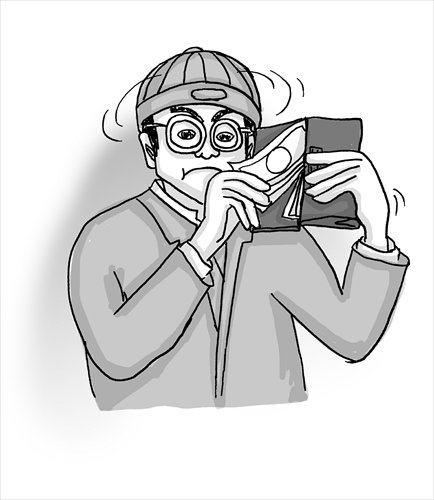HOME >> BUSINESS
Financial logic explains China’s capital exports
By Chen Yi Source:Global Times Published: 2015-3-12 16:43:01
Country’s large savings surplus opens door to outbound investment

Illustration: Lu Ting/GT
There's something both interesting and confusing about China's capital inflows and outflows.
First of all, the country is a net capital exporter, with outbound investment surpassing foreign direct investment (FDI). Despite the large amounts of FDI recorded every year, China's capital outflows have grown faster, as reflected by the central bank's newly added foreign exchange reserves over recent years. According to data released by the State Administration of Foreign Exchange, the country recorded a net FDI increase of $258.2 billion in 2013, while foreign exchange reserves saw a net gain of $432.7 billion during the same year. The latter surpassed the former nearly every year between 2001 and 2013 - with 2012 offering the only exception.
At first glance, this phenomenon seems quite puzzling. If, as many believe, China is a capital-scarce economy, how can it export large amounts of capital? In other words, why does a "poor" country like China want to become a creditor?
As we all know, the rate of return on FDI in China has always been considerable; while on the other side, the foreign exchange reserves of the People's Bank of China (PBC) are mainly composed of US Treasury securities and other low-risk assets which generate low returns. Over recent years, figures show that the rate of return on China's foreign liabilities has generally been about 4 percentage points higher than that of its outward investments. In fact, the returns on China's net foreign assets have always been quite limited, with negative net returns even recorded during certain years.
There is a certain degree of inevitability though about the phenomena mentioned above. For starters, a series of structural factors - such as demographic trends, an underdeveloped financial market, an incomplete social welfare system and rigid demand for housing - have determined China's high savings rate. Although the country's investment rate is already exceptionally high compared with other countries around the world, its savings still far outpace investment - and is expected to remain so throughout the foreseeable future. With savings exceeding investment, the country has a huge current account surplus, so it is understandable that China has become a net capital exporter. From an accounting perspective, income that is not consumed is ideally supposed to buy foreign assets.
Second, some critics say that a capital-scarce country should not export capital. The logic behind this standpoint is that capital-scarce countries usually post higher return rates on investments, meaning that capital usually flows from capital-abundant countries like the US to capital-scarce places like China. This view is actually flawed as it overlooks the fact that investors are not only profit-driven but also risk-averse. In other words, return rates are not the only factor determining the direction of capital movements.
Third, it makes sense for China to let its borrowers earn high profits with its money. Basically, the same dynamics are at play when banks use the money in low-yield deposit accounts for high-return lending and investment. This is indirect financing in action. Compared with ordinary investors, banks and financial intermediaries are better at choosing sound investment projects, controlling risks and minimizing transaction costs. By offering people the services they need, financial institutions play a more effective role in resources allocation. In a fully competitive market, investors tend to choose the financial intermediary that can provide them with the best service. In this sense, one could say the US is the best bank in the global market.
The importance of indirect financing though should not be exaggerated. In fact, China's relatively low return rates on outward investment are in part due to its policies, which haven't yet achieved full capital-account liberalization. Since the private sector still cannot freely invest in overseas assets, investors have to sell foreign exchange earned from trade to the central bank. For the PBC, the security of outbound investments outweighs the importance of realizing high returns; therefore, a reasonable choice is to buy US Treasury securities and other safe-haven assets.
Once China fully opens its capital account, the country will continue to be a net capital exporter, but the structure of these exports will change significantly. The private sector will probably place more money in foreign banks, buy more foreign stocks, and make a substantial amount of outbound direct investment, all of which will post higher returns than US Treasury bonds. In the process, China's returns from outward investments will improve dramatically.
The author is a deputy director with the School of Economics, Peking University. bizopinion@globaltimes.com.cn
China Business News
Posted in: Comments